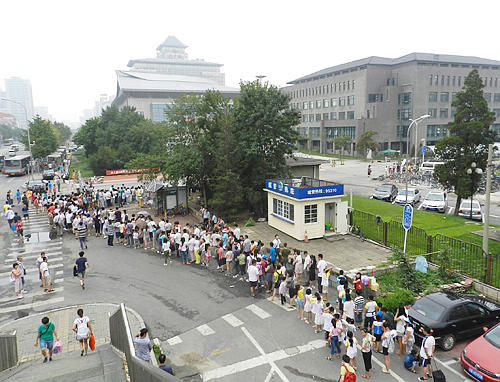|
 |
|
CROWDED CAMPUS: Tourists line up at the eastern gate of Peking University on July 17 waiting for a campus tour (XINHUA) |
Tobacco Companies
Tobacco companies were recently denied inclusion in the China Charity Award 2010 category for most caring business.
In 2008, due to strong public opposition and an ardent anti-smoking campaign, six tobacco companies were removed from the list. In the past, the struggle against tobacco businesses was an uphill battle, but now the China Charity Award is quick to exclude tobacco companies.
Tobacco companies are interested in the charity prize because they hope to use it as a publicity tool. Today, these companies are using various channels to get their names out to the public.
As more people learn about the dangers of smoking and take actions to curb tobacco use, tobacco companies are investing heavily in rebranding themselves as responsible businesses.
Despite their generous donations to charity programs, the serious social problems caused by tobacco companies are striking. China is home to 350 million smokers, and every year at least 1 million people die of diseases related to tobacco. The more tobacco companies invest in charity, the more profits they are making, which incurs serious problems on society.
The sound growth of charities depends not only on financial support, but sound morals. Charities, society and especially relevant government departments should join hands to realize a balance between the two, thus pushing charitable efforts in China toward a brighter future.
Beijing Times
College Visit Limit
China's prestigious Peking University has always been among tour group destinations during the summer holiday. This summer is no exception. Recently, the university decided to limit the number of tourists from mid July to mid August—5,000 persons are allowed to enter the campus each day. Some tourists are not happy with this limit.
The Chinese are used to the belief that Peking University does not belong to itself, but to the whole country. But this does not mean the university has to submit all of its management schemes to the public for approval. Peking University is not a government department or public playground, but an academic institution. To ensure order on the campus during the summer holiday, is there anything wrong with limiting tourists? Universities are supposed to be tranquil places far from the maddening crowds, places for students to concentrate on academic research and to enjoy a peaceful life.
In recent years, many prestigious universities have been listed among traveling destinations. Universities should always remain open to the public, but under the precondition that normal campus order must not be disturbed. If universities are used as one of the commodities to boost tourism in excuse of the public's demand, it will be a disaster to this place of education.
Beijing Times
Construction Quality
It's been reported that the construction of 5 million apartments for low-income families has started as of the end of June, accounting for half of the 10 million apartments established as this year's goal. However, in May, the number of constructions was only 3.4 million sets, and within just one month, it jumped to 5 million sets.
The sharp increase is pleasing but also perplexing, because starting constructions does not necessarily mean everything will be okay, particularly the building quality. If the focus is totally on quantity, we might end up with jerry-built projects.
For example, in Zhengzhou of central China's Henan Province, eight residential buildings that had just been built for relocated residents from other areas were ordered to be torn down because of quality deficiencies.
Indemnificatory apartments are provided by the government to mid- and low-income families. These apartments will not bring profits to local governments, but they are the basis for social harmony.
The important thing is not how many apartments are being constructed, but how many have been completed and how to ensure every apartment is safe. With the development of this program, a relevant accountability system is needed to ensure timely completion and quality of these houses.
Yanzhao Evening News
Manufacturing Cold Snap
The sudden shutdown of toy manufacturer Suyi and textile company Dingjia in Guangdong Province's Dongguan, one of China's biggest manufacturing bases, casts a dark shadow on the whole local manufacturing industry. At least 10 percent of Dongguan's textile manufacturers are struggling under excessive pressures.
Three years have passed since the financial crisis broke out, but this round of bankruptcies is likely to repeat the recession seen in 2008. Partly, it is a result of declining orders from the EU and North American markets, but more importantly it has more to do with internal factors than with external market.
The shortage of labor in China's coastal manufacturing bases has led to rising labor costs and this is squeezing businesses' profit margins. In economics, there is a term called the Lewis Turning Point, which marks a point where sufficient labor supply turns to labor shortage. The era of making huge profits by paying mean wages may be at an end.
The arrival of this turning point means businesses have to pay more for labor, and this undoubtedly proposes the subject of turning to technology and capital-intensive from the traditional labor-intensive mode. Some companies have begun to move to China's mid-west regions looking for low-cost labor, but in the long run, industrial upgrading is the inevitable choice.
Meanwhile, the government may consider cutting tax burdens on small- and medium-sized enterprises and trying to help businesses out of bankruptcy's shadow by providing financial support, technological platforms and information to break the bottleneck for industrial upgrading.
Chongqing Times | 